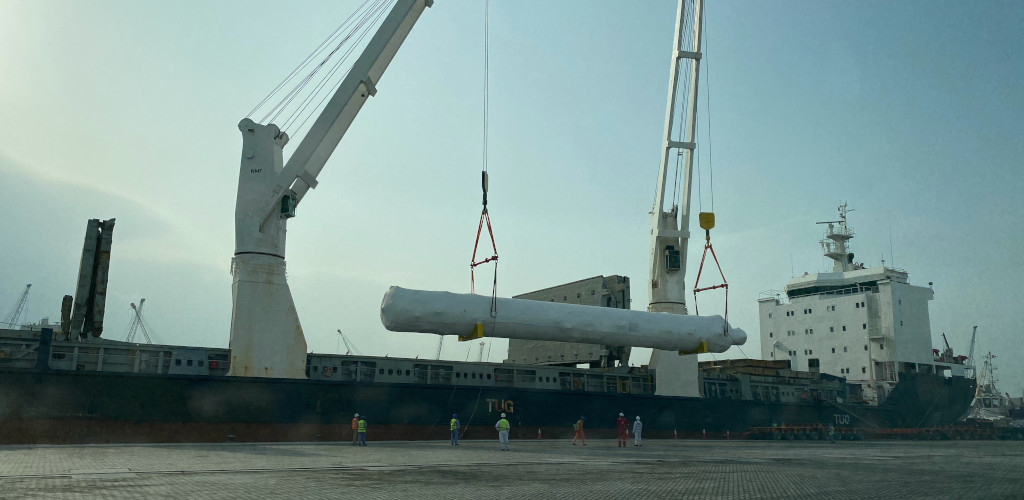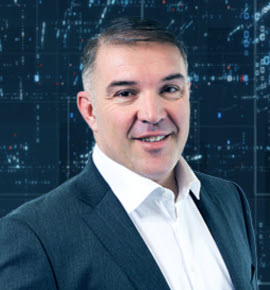Frederic Fontarosa Speaks to Breakbulk on the Sidelines of BBME

By Liesl Venter
As the project sector continues to recover from the Covid pandemic, the breakbulk shipping and port services arm of Wilhelmsen Group in the Middle East is optimistic of double-digit growth in 2023.
“Covid is now behind us,” said Frederic Fontarosa, the group’s Dubai-based vice president for the Middle East, Africa and the Indian subcontinent. “Project activity levels have returned to normality and the industry is picking up once again more or less where it was left off before the pandemic.”
Speaking to Breakbulk on the sidelines of Breakbulk Middle East 2023 in Dubai, Fontarosa said he was optimistic about the year ahead and the robust state of the market.
 “We are now noticing an uptick in the project sector, especially in the Middle East, and we are back to pre-Covid levels of involvement in the region.
“We are now noticing an uptick in the project sector, especially in the Middle East, and we are back to pre-Covid levels of involvement in the region.
"I would go so far as to say there has even been a slight increase in activity, especially with our team’s focus and involvement with certain UAE national energy renewable projects such as the first UAE windfarm project supporting Roll Group. It is, of course, difficult to judge the entire sector, but from our level of involvement, we are seeing very positive developments.”
Many projects that had been placed on hold during the pandemic were finally back on track, along with renewed interest to invest, particularly in the Middle East, he said.
“We booked over 150,000 tonnes… amid a very challenging 2022 for a RoRo freight market challenged with space capacity,” said Fontarosa.
“With our continued involvement in several initiatives ahead of the COP28 (United Nations Climate Change Conference) to be hosted by the UAE, we are targeting double-digit revenue growth this year,” he said. “With our focus on RoRo, heavy lift, general cargo and renewable energy projects, presently we are very confident that we will achieve this.”
Fontarosa said the sector was posing far less risk than what had been the case during the pandemic, and indications were that the project sector would see sustained growth over the next few years, particularly in the energy and renewables sector which was seeing high demand for projects in the Middle East.
“In Africa, we are seeing more challenges than what we do in the Middle East, particularly around the lack of infrastructure that does have an impact on ports and the movement of cargo. In the Middle East, there continues to be a high level of investment in infrastructure. Most of the countries here see their income generated by the price of oil that last year reached very high levels, and so there is a sustainable investment.”
According to Fontarosa, Wilhelmsen has identified Dubai and Abu Dhabi as logistical hubs for cargo into East Africa. “Together with our parent company and valued principals’ tonnage, we transport from here into East Africa using smaller vessels that the ports in these regions can accommodate. It does require a lot of logistics coordination, but it addresses the infrastructure challenges faced on the continent. On the positive side, investment into African ports is increasing with countries such as Mozambique, Kenya and Tanzania having identified port development as priorities.”
From a shipping line perspective, investment into innovation was ongoing, he said. “There is a major focus on driving down our environmental footprint, and we are investing heavily in digitalization.
“What does this mean for the project logistics sector? Improved track and trace of cargo delivery, easier end-user access to information and improved efficiency of operations. We continue to focus on the value-add that we can bring to clients with a sharp eye on the carbon footprint.”
TOP IMAGE: Loading a distillation tower at Saqr Port. CREDIT: Wilhelmsen Group
INSERT: Frederic Fontarosa. CREDIT: Wilhelmsen Group
